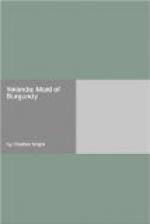I shall give you here ten lines concerning myself. I am Italian by birth—a younger son of the noble House of Pitti. I left home when but little more than a boy. Journeying to the East, I became Sir Karl de Pitti, Knight of the Holy Order of St. John, and in consequence I am half priest, half soldier. My order and my type are rapidly passing away. I fought and prayed in many lands during twenty years. To be frank, I fought a great deal more than I prayed. Six years out of the twenty I spent in Burgundy, fighting under the banner of Duke Philip the Good, father to Charles the Rash. My mother was a Burgundian—a Walloon—and to her love for things German I owe my name, Karl. During my service under Duke Philip I met my Lord d’Hymbercourt, and won that most valuable of all prizes, a trusted friend.
Fifteen years before the opening of this story I grew tired of fighting. How I drifted, a sort of human flotsam, against the crags of Styria would be a long, uninteresting story. By a curious combination of events I assumed the duties of tutor to the small count, Maximilian of Hapsburg, then a flaxen-haired little beauty of three summers. I taught him all that was needful from books, and grounded him fairly well in church lore, but gave my best efforts to his education in arms.
Aside from my duties as instructor to the young count, I was useful in many ways about the castle. By reason of the half of me that was priestly, I could, upon occasion, hear confession, administer the holy sacrament, and shrive a sinner as effectively as the laziest priest in Christendom. I could also set a broken bone, and could mix as bitter a draught as any Jew out of Judea. So, you will see, I was a useful member of a household wherein ancestry took the place of wealth, and pride was made to stand for ready cash.
The good duke might have filled his coffers by pillaging travellers, as many of his neighbors did; but he scorned to thrive by robbery, and lived in grandiose but honest penury.
Max took readily to the use of arms, and by the time he was eighteen, which was three years before our now famous journey to Burgundy, a strong, time-hardened man might well beware of him. When the boy was fourteen or fifteen, I began to see in him great possibilities. In personal beauty and strength he was beyond compare. His eyes were as blue as an Italian sky, and his hair fell in a mass of tawny curls to his shoulders. His mother likened him to a young lion. Mentally he was slow, but his judgment was clear and accurate. Above all, he was honest, and knew not fear of man, beast, or devil. His life in Styria, hedged about by ceremonious conventions, had given him an undue portion of dignity and reticence, but that could easily be polished down by friction with the rougher side of the world. Except myself and his mother, he had never known a real friend.




